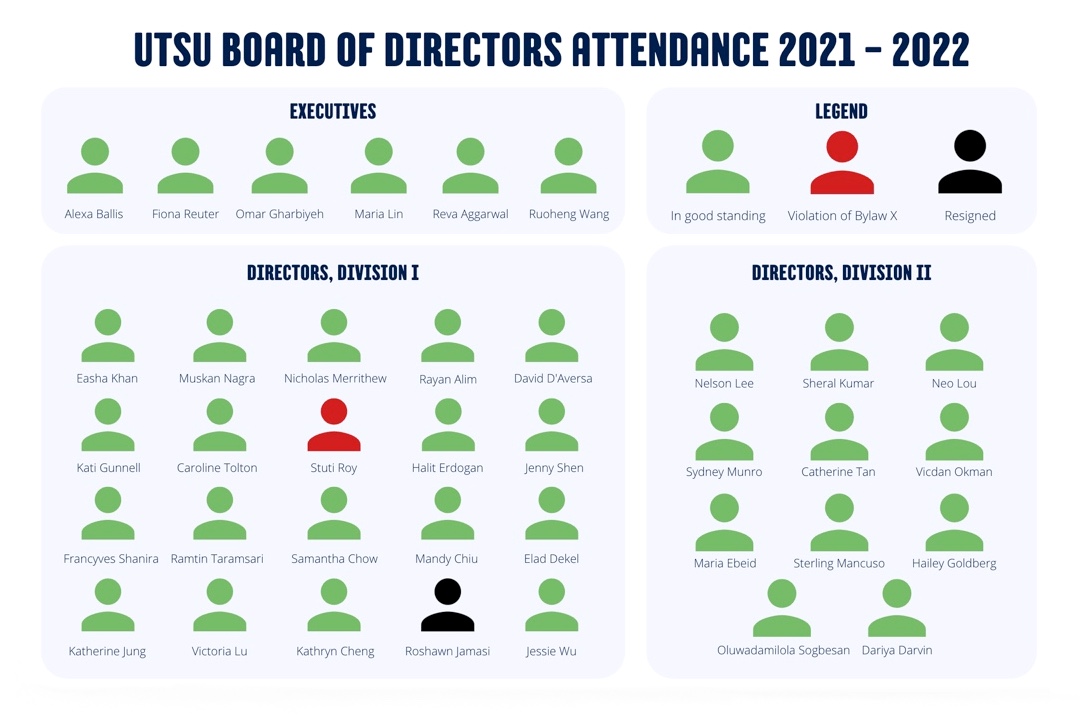According to attendance records for the University of Toronto Students’ Union’s (UTSU) Board of Directors meetings, only one out of its 37 sitting members was deemed to have abandoned office this year, according to Bylaw X. Additionally, one director has resigned.
Bylaw X, a section of the UTSU’s governing document, outlines the parameters for the number of meetings that directors need to attend to fulfill the duties of their office and how many absences indicate that a director is deemed to have abandoned office.
The analysis marks a consistent improvement in UTSU attendance over the last few years. The Varsity’s 2021 analysis found that in the 2020–2021 school year, three directors were deemed to have resigned.
Changes to Bylaw X
According to Bylaw X, if directors have unexcused absences at a certain number of meetings, they may be deemed to have resigned. Directors are deemed to have resigned if they have accumulated two consecutive unexcused absences and have not responded to attempts made to contact them by the speaker and vice-president, operations for at least 21 days.
Although attendance increased this year, the UTSU has proposed a number of changes to Bylaw X to loosen attendance requirements for directors. The amendments regarding the Abandonment of Office portion of Bylaw X would increase the number of absences at board and committee meetings allowed before directors are designated as having abandoned office. Moreover, if directors receive an excused absence or send their regrets before the meeting, they will be considered present at the meeting, even if they cannot attend it. The changes will be voted on at the upcoming UTSU Special General Meeting.
If the amendments are accepted, a director would be deemed resigned if they accumulate 10 unexcused absences at any meeting, six unexcused absences at committee meetings, or four excused absences at board meetings. The amendments would also change the contact policy for absences — directors could report to either the speaker or the vice-president, operations to get their absences excused.
Furthermore, the notice period that must be given to a director if they are deemed to be resigned would be extended to 10 days, instead of seven. Finally, a director would be given a prolonged opportunity to speak in their own defence during the debate of a motion to accept their resignation — a period of 15 minutes, instead of the original five.
Vice-President, Operations Fiona Reuter, who proposed the changes to Bylaw X, wrote in an email to The Varsity that Bylaw X has long been controversial and that the changes serve to address criticisms of the bylaw. Reuter further expressed hope that the amendments will be accepted in the aims of “ensuring that Executives are held more accountable to their roles and positions, while also providing Directors more flexibility in writing.”
One director deemed resigned
Victoria College’s Director Stuti Roy has been deemed resigned on the basis of missing a total of four unexcused meetings. A number of other directors had two or more absences, but Reuter wrote that they were not deemed resigned since some of the absences were not consecutive, and others contacted a member of the executive committee following their absences.
In an email to The Varsity, Roy wrote that the reason for her absences was that she graduated in fall of 2021 and is no longer an active student. Roy wrote that she assumed her graduation meant that she would not have to hand in a formal resignation.
“I should have handed in my resignation when I stopped being an enrolled student. I will be giving a full statement at the Board of Directors meeting on 30th January,” wrote Roy.
“I am very grateful for my time at the UTSU,” Roy added.
Reuter commended the dedicated directors who have made “great efforts to get involved,” despite the ongoing pandemic, while also recognizing the role that the UTSU executives’ flexible administration played in achieving strong attendance.
Editor’s Note (January 17): This article has been updated to include comment from Stuti Roy.


